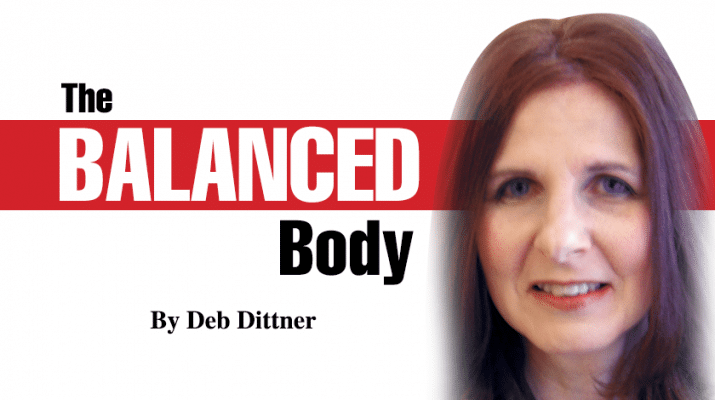Map out lifestyle of sound diet, plentiful exercise and sleep
By Deb Dittner
 Receiving a diagnosis of cancer can be devastating.
Receiving a diagnosis of cancer can be devastating.
No one wants to hear those three words: “You’ve got cancer,” producing an overwhelming feeling.
So many questions arise.
If you or a loved one receives a cancer diagnosis, there are many steps you can take to make the going a bit easier. Enlist the help of either a family member or close friend to be by your side and for the extra pair of ears, for support, for company during tough times.
Sure there are times you will want to be alone to think things through for yourself, but that extra hug is so much needed.
The first and most important step to take at this time is to simply take a deep breath, and then another and another.
Breathing is effective in reducing stress and calming down the central nervous system. There are a number of techniques for you to choose from, but I find this 4-7-8 breathing technique from Andrew Weil to be one of the best. The technique is simple and easy to learn:
— Inhale through your nose to the count of four.
— Hold the breath to the count of seven.
— Exhale loudly through the mouth to the count of eight.
— Repeat for a total of four rounds.
Incorporate this into your daily routine in the morning on awakening, before bed as it aids in sleep, and any other time you feel the need.
Build a team. You will want to search out the best oncologist for your specific type of cancer. You need to ask how much experience they have, do they keep up with current research, and do they have colleagues to discuss your situation.
Integrative and functional medicine practitioners will provide you cancer supported treatments for the whole body and not just the symptoms by incorporating supplements, intravenous therapy, stress management, and more.
To create a team that is just right for you, network by interviewing your primary care provider, family, friends, and support groups.
— Decrease inflammation. Anti-inflammatory foods such as dark green leafy vegetables, low glycemic fruits, nuts and seeds need to become your friends.
Reduce to eliminate processed white food-like products especially sugar (as this feeds cancer), hormone-laden dairy, and animal products.
A plant-based diet (preferably organic) needs to make up the main portion of your daily meals. Juicing — especially celery juice of late provides nutrients and hydration and can be considered medicinal.
Processed foods a ‘no-no’
Stay away from store-bought processed juices, as they are sugar-laden. Smoothies — especially green smoothies — are an easy way to get three servings of vegetables and one serving of fruit into your day.
Reducing environmental toxins by cleaning up your personal care products and home cleaning products will decrease the amount of hazardous chemicals causing long-term health consequences.
You are exposed to these toxins on a daily basis, so it’s best to search out products with a minimal amount of chemical exposure.
Make sure you move. Rest is important but living a sedentary lifestyle causes muscles to waste, decreases endurance and immunity, and actually causes increased fatigue.
Physical movement keeps your muscles strong and flexible, and reduces inflammation. Exercise on a daily basis for at least 10 to 30 minutes (work up to 60 minutes) can consist of walking, yoga or chair yoga, light weights, dance, or whatever types of movement you like.
I can’t say enough about proper sleep. Restful sleep for seven to nine hours nightly will allow your body to heal and respond to treatments of all sorts, such as surgery, chemo, radiation, acupuncture, and massage. Your bedroom should be kept cool and dark.
Avoid using technology (iPads, iPhones, computer, TV, etc.) for a minimum of one hour before sleep as these are considered stimulators affecting sleep. Take an Epsom salt bath with therapeutic grade essential oils such as lavender. Read a book. Avoid caffeine after noon.
Reduce stress. There are many ways to manage stress. One way is by using the breathing technique mentioned above.
Also consider meditation (there are a number of free apps that work wonders), yoga, hiking, massage, and hobbies. Whatever you need to do to bring peace into your day will help manage the sense of being overwhelmed.
To help you find information, I have included a few sites and apps for you to research.
Also consider researching the following: American Cancer Society, Cancer Treatment Centers of America, American College for Advancement in Medicine, and American Association for Naturopathic Physicians.
Helpful references
— https://www.ewg.org/: Environmental Working Group’s Clean Fifteen and Dirty Dozen
— https://kriscarr.com/: Kris Carr was diagnosed with cancer in 2003 and has written many books, meditation guides and more providing information for mind, body and soul.
— https://www.ultrawellnesscenter.com/: Located in Lenox, Mass., the providers look to identify the root cause of illness.
— https://www.chrisbeatcancer.com/: Chris Wark was diagnosed with cancer in 2003. He is a published author and has created a coaching program for cancer patients and caregivers.
— https://hippocratesinst.org/: Hippocrates Health Institute located in West Palm Beach, Fla.
— CALM: Meditation app
— Simple Habit: Meditation app
• Deborah Dittner is a family nurse practitioner and health consultant. Her mission is to transform as many individuals as possible through nutrition and lifestyle changes. For more information, check out her website at www.debdittner.com or contact her at 518-596-8565.

